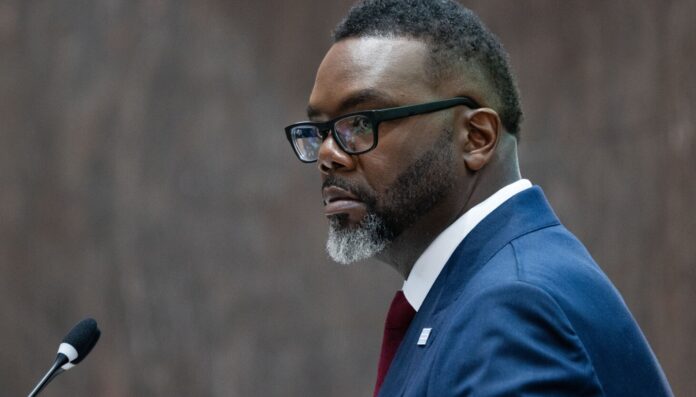After a frantic search for votes that came up short, Mayor Brandon Johnson has called off Friday’s vote on his 2025 budget — a vote he was destined to lose.
Even some members of the mayor’s Progressive Caucus, including Ald. Rossana Rodriguez Sanchez (33rd), Jessie Fuentes (26th) and Ald. Nancy Clay (46th) were refusing to play along by passing a budget balanced with the help of a $68.5 million property tax and a slew of other taxes,
They may well have been afraid to go down with the ship. Johnson already was short of votes, and no one wanted to be on the losing side.
Johnson will now spend the next few days making additional changes in hopes of attracting the 26 votes needed to pass the budget at a meeting next Wednesday.
What’s most surprising about Friday’s embarrassing cancellation is that the vote had been scheduled at all. A central rule of politics is to never call for a vote you’re destined to lose. Johnson never apparently had the votes, but set Friday’s meeting in hopes of persuading those on the fence. He never had more than 19 rock-solid votes.
Fearful of a reduction in the city’s bond rating that could cost the city’s ability to borrow money, Johnson has steadfastly refused to reduce a big chunk of his budget: a $272 million pension advance payment, above the amount actuarially required.
But Wall Street is watching, and the marathon budget stalemate will likely cause that drop anyway. Shrinking the pension advance therefore becomes more likely.
He also will need to consider deeper cuts in City Hall bureaucracy, even the layoffs he previously has ruled out.
Johnson has struggled to get the 26 votes he needed to pass the budget and revenue package, even after rewriting both several times.
The mayor originally proposed a $300 million property tax increase that broke his campaign promise to hold the line on property taxes, then agreed to cut it in half after the City Council took the extraordinary step of rejecting it by a unanimous vote.
Only then, did he land on the $68.5 million increase, which matches the increase in the cost of living over the last two years.
He proposed a 34% increase in the liquor tax, then agreed to scrap altogether after an outcry from the hospitality industry and border ward alderpersons whose bars, restaurants and liquor stores could lose business to surrounding suburbs.
The mayor agreed to restore 162 Chicago Police jobs tied to implementing a consent decree outlining the terms of federal court oversight over the Chicago Police Department after Il. Attorney General Kwame Raoul threatened to ask a judge to hold the city in contempt.
And he cut $90 million worth of spending from federal pandemic relief funds, in part, by scrapping a second round of guaranteed basic income.
Johnson steadfastly refused to avoid layoffs of furlough days that would impact the unions that put him in office. Nor would he risk eliminating hundreds of police vacancies.
He also resisted calls to roll back city spending to pre-pandemic levels and cancel $50 million in new investment in youth jobs and his unified “One Shelter” program.
Instead, he cobbled together $256 million in taxes, fines and fees that beleaguered Chicago taxpayers will feel at multiple levels.
The $68.5 million property tax increase is expected to cost the owner of a home valued at $500,000 roughly $111.
The $1.878 billion property tax levy that includes the increase was lumped into the overall tax package for fear that Johnson would lose a vote on a stand-alone $68.5 million property tax increase.
In the past, the property tax levy has been a separate vote. Failing to do so could raise legal questions. And it may not comply with a state law that requires the city to notify property owners of the levy for the coming year at least 20 days before Dec. 31.
The budget also includes increased taxes on everything from cloud computing, streaming services and parking to downtown congestion and take-out bags.
The increase in the personal property lease tax — from 9% to 11% — on cars, business equipment, software and cloud computing is expected to generate $128 million. But, Chicagoland Chamber of Commerce President Jack Lavin has condemned the increase as a “job-crushing head tax.”
He has accused Johnson of relying on a “nickel-and-dime approach” that will be felt by “every Chicago resident” already squeezed by rising cost of groceries, housing, health care and child care.
